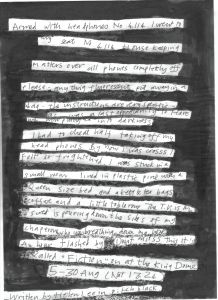Intro by Maddy Costa: The second meeting of the new Margate Theatre Club took place last month and by all accounts it was a night of fireworks. The growing group met to see and talk about Rachael Ofori’s Portrait, a sharp and funny set of vignettes held together by the story of Candice, a quick-witted black teenager with an incisive view on gender and race politics. The brilliant volunteers who run the group managed to bring some first-timers to the Tom Thumb theatre, who stayed behind for the discussion, then wrote these energetic responses. Reading them, I’m consumed with disappointment at not being there myself. The group next meets on November 19 for KILN’s fascinating A Journey Round My Skull: a show that burrows into the brain in ways that should inspire another lively discussion.
By Kat Cutler-MacKenzie
I was inspired, horrified, engaged and even once insulted… but it was one of the best things I’ve done all year.
I knew about the Tom Thumb Theatre – it’s precisely 12 minutes and 14 seconds from my front door – but had I ever been in? Part of me was scared that I would be outnumbered by funky DFLs [Down From Londoners] and local hipsters, the only one who wasn’t ironically sporting a polar neck. I’m just not nonchalantly cool. The other part of me feared a desolate theatre; I imagined the local operatic society performing Cats (jazz hands and all), while myself and an overzealous usher were condemned to front row seats and skin-tight spandex.
However, to my relief the evening began like one might imagine a fairy-tale. The entrance was a secret passage way, lit with fairy lights and nestled just out of sight; enchantingly mysterious but unarguably Margate. There was a golden glow, auditory and visual, that radiated from within. I knew that the theatre club would be cosy if nothing else.
Portrait (Racheal Ofori) was accomplished and particularly poignant to a young woman of 18. It provided an abundance of issues for debate, and drew from us the politically correct to the politely condescending (thanks Racheal). In what was only the second gathering of Margate Theatre Club I couldn’t quite believe that so many people would stay behind to discuss the work.
We agreed, we disagreed. I didn’t want the discussion to end. We were arguing gender, race, class – how could it? Yes, of course, there were the few who “just thought the play was marvellous” and were “ever so proud” of a young black woman setting up in the world. But the majority were sharp – they were quick yet thoughtful and certainly weren’t afraid to challenge my ideas. Ace.
An unfortunate clash of perceptions did leave me feeling a little bruised and it took a day or two to rinse out the sour taste. But it was nothing a drink from the surprisingly well stocked bar couldn’t solve.
The evening ended like a fairy-tale too: I was elated, the clock was slowly nearing midnight and the next day it could all have been a dream. In fact, my companion did lose her shoe on the step and yes, Portrait by Racheal Ofori was something I thought could only ever be wished for.
By Thea Barrett
On a rather chilly Saturday evening, almost the entire audience of Rachael Ofori’s show Portrait stayed in the tiny theatre after the performance to discuss the brilliant piece they had just witnessed. The discussion covered many topics, including racism, sexism and class differences, encouraged by the group leaders who were both thoughtful and enthusiastic, lending themselves perfectly to help the discussion at hand evolve and go deeper into the topics that were displayed so brilliantly throughout the show.
The show itself was thought provoking, as well as surprisingly funny and something most wouldn’t have discovered if it weren’t for Fuel and Margate Theatre group. A one-woman show was territory I hadn’t ventured into before, and was inspired to see a young black woman present such difficult topics that many would have hid away from, while doing so in verse, so brilliantly.
The group managed to be original in its choice of play, supportive of local business in its choice of location and enjoyable in its entirety. I was pleasantly surprised when entering the theatre, not just by its quirky atmosphere and design, but by the completely packed audience. There was most definitely a buzz in the air as people – like myself – weren’t quite sure what to expect, which continued into the discussion after. This featured a fairly wide range of people, yet it managed to stay on topic and, despite disagreements, was as thought provoking and funny as the play.
I will openly admit I left the theatre angry at parts of the discussion I had just taken part in, frustrated at not getting in the last word – but also waiting for the next session to occur, another show to discuss, another argument to present. The discussion was passionate to say the least, the argument heated and the group divided, never the less there was one uniting factor: how brilliant everyone had found the entire experience. As I left, I found myself saying “see you next time” to my previous adversaries, all of us preparing for the next group.
